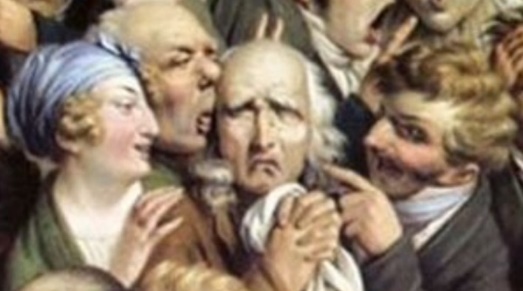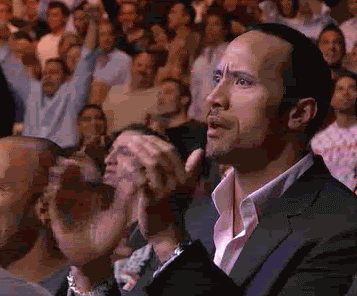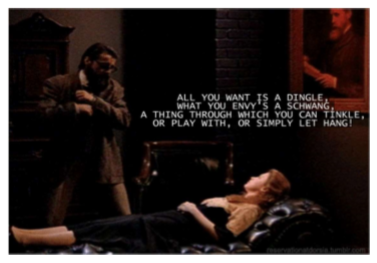Every Australian knows that Jeff the Wiggle is a notoriously deep sleeper. No matter how loud you blast “Hot Potato” or “Toot Toot, Chugga Chugga, Big Red Car” Jeff just never seems to wake from his slumber. However, after you read Nick Enright’s “Blackrock” and have had your epiphany as to the true nature of Australian culture, Jeff won’t ever sleep again as all you’ll want to do is scream “Wake up, Jeff!” and tell him how our whole identity is underpinned by an inherent and pervasive darkness that glorifies toxic masculinity, misogyny, alcoholism and other super dark shit; after all, in the words of Diane, “How [could] you sleep after hearing a thing like that?”
Here’s 3 truths about Australian society/culture revealed in the 1995 play “Blackrock” that will make you want to scream “Wake Up, Jeff!” at the top of your lungs:
1. Australia has a real drinking problem:
The Wiggles make a concerted effort to promote healthy eating and living habits to young Australians in their formative years. In the hit songs “Fruit Salad” and “Vegetable Soup”, the crew tell the audience how yummy “melon” and “tomato” can be and remind them just how delicious healthy food is. Furthermore, in their song “Getting Strong!”, the gang promotes healthy exercise habits including “running on the spot” and “skipping with a rope”. Clearly, the Wiggles are firm believers in the notion that the body is a temple and probably run their own wellness blog that spouts dodgy pseudoscience about re-aligning your chakras and carrot juice enemas.
By contrast, if the Wiggles treat their bodies like temples, the characters in “Blackrock” treat their bodies like dingy country pubs. What’s made obvious by Enright is just how much Australian youths like to drink, and I’m not talking spinach acai smoothies. We’re talking alcohol, and in very large volumes.
The first reference to alcohol in the play is made within the initial scene as Toby describes his planned 18th birthday party as a “keg show down the surf club”. Clearly, the amount of alcohol available to be consumed at the party will be excessive as “[kegs]” traditionally hold over 50 litres of liquid each. Furthermore, Toby suggests the alcohol consumption will result in spectacular drunken behaviour, a “show” of sorts. The quote also highlights the link between youth culture and alcoholism. Given the amount of alcohol available, it seems that in the eyes of Toby and his mates, the party will only be a success if it is a true piss up; this indicates that the youths’ in Blackrock have been conditioned to perceive excessive alcohol consumption (read binge drinking) as a normal and acceptable part of celebrations. Also, the “surf club” can be seen as a bastion of Australian youth culture and its carefree, beach bum attitude, hence by holding his 18th at the club, Toby inadvertently reinforces the link between Aussie youth culture and alcoholism. Given Toby’s plan to drink himself silly at his 18th, there’s really no doubting what the Wiggle’s Reaction would be; “Oh No!”.
Enright further reinforces the link between youths and alcohol through Glenys’ reaction to Cherie’s claim that she’ll be responsible at Toby’s party; “I’ll be ok. I won’t drink.” Glenys reads right through her smokescreen and asks her what she’ll do instead, “stand and watch?”. Here, Enright strengthens the link between drinking and partying; “stand and watch” suggests that Cherie would be a lone teetotaller spectating a night of drunken debauchery. Furthermore, Glenys’ attitude indicates that the adults of “Blackrock” are well aware of their kids tendency towards binge drinking, and rather than challenge or punish such behaviours, either turn a blind eye or actively encourage it (Glenys practically challenges Cherie to get drunk at the party). Again, another “Oh No!” in the coloured crew’s book.
Ricko is depicted as the ultimate boozer in the play by Enright. His drinking habits rub off quickly on Jared, who after one night with him “came home well after midnight, [fell] through the front door and [spent] half the night throwing up.” What Jared displays is the effect of excessive short term alcohol consumption (a state of “stupor” and a BAC between 0.25%0.40%) which his mum Diane blames solely on Ricko’s return. Furthermore, Ricko’s alcoholic influence also threatens Jared greater life and prospects including “school [and] work”. Ricko is seemingly an alcoholic, given that his preferred mode of emotional comfort is a bottle of Tennessee’s finest. In search of Jared to ensure his commitment to their big lie, “Ricko appears [at the beach], holding a half empty bottle of Jack Daniels.” In response to the realisation of the gravity of the situation he finds himself in, Ricko turns to alcohol to soothe his worries. This in turn causes him to partake in risky behaviour (inferred drink driving as his “van [pulls] up” before he emerges drunk) and become increasingly aggressive towards Jared; first through intimidation him by asking “where the fuck have you been?” and eventually through violence as he “[raises the trophy] to strike Jared”. Here, Ricko’s boozing is presented as a negative facet of his character that contributes to the failure of his once strong relationship with Jared but also as something that feeds his excessive machismo (which resulted in him murdering Tracy earlier in the play). Through Ricko, Enright depicts the antisocial effects of excessive alcohol consumption and how it eventually leads to the destruction of character (by bringing out their worst traits).
By highlighting the relationship between Australian youth culture and alcohol consumption and focussing on the destructive nature of alcoholism within his play “Blackrock”, Enright questions the place/role of alcohol within Australian culture. The depictions within the play paint alcohol as central to Australian culture, and given the negative portrayal, it can be inferred Enright is critical of this facet of our culture.
A country built on slabs of tinnies and populated by legless hoons whose lifeblood is the amber Eau de VB… Definitely a problem. Jeff’s certainly not sleeping through this revelation.
2. Misogyny is alive and well:
Respecting women is the Wiggle’s middle name. They’ve proven time and time again that they support gender equality and strive to promote it to young Australians. Dorothy the Dinosaur, arguably the most well renowned female Australian kids TV supporting character, was the first character of the Wiggles to be introduced when it aired in 1991. From there she’s gone on to star in over 7 solo spin off series and cemented her position as the most prominent Wiggles side character. The Wiggles also proved resolute in their decision to replace Greg (the yellow one) with Emma despite vocal backlash, stating that the change would make the Wiggles relevant “into the next generation”. After becoming part of the crew in 2013, critics were quickly silenced as Emma consistently ranked the most popular of the new Wiggles. However, if you delve a little deeper, another more concerning reality comes to light that challenges what I’ve said above. The female characters in the Wiggles stick pretty hard to traditional gender stereotypes; Dorothy isn’t some kick ass man eating t-rex but a subdued, lady-like tutu-donning “rosasaur” (a dino that eats roses duh!) whose favourite activities are “eating roses, gardening, singing and making rosy tea”. Sadly, the same is the case for Emma, who wears a skirt and big bow ties and is frequently dancing or playing a mum or queen whilst the guys get to do the big-boy jobs (by that I mean firefighting, piloting or driving the Big Red Car).
This hidden unfairness is prevalent in Australian society and manifests itself in even more concerning ways than the reinforcement of gender stereotypes. These manifestations include the acceptance of an increasingly toxic perception of masculinity and most concerningly, Australia’s disproportionately high rates of domestic violence. Whilst it may seem to most an invisible issue, Enright foregrounds the misogynistic behaviours
perpetrated against Blackrock’s female characters and how these are widely perpetuated and accepted in its greater society.
The audience is hit by the rank smell of misogyny within the first scene of the play. When Jared tells his friends that girls can’t surf because they have the “wrong centre of gravity”, local girl Cherie interjects by challenging his claim through a local female surfing “legend” Wendy Botha. Jared writes this challenge off by claiming her prowess is due to her nonfeminine physicality, “[she’s] built like a guy”. Clearly, Jared demonstrates a negative perception of females, evident by the way he diminishes the achievements of a female by attributing her success to her “masculinity” (as if success is only achievable for males). The notion of femininity as being specific to stereotypical physique is confirmed later on in the scene as the boys “froth” over supermodel “Elle Macpherson”; her success is not challenged by Jared as it is considered acceptable because it is derived from her excessive stereotypical femininity (read physical attractiveness).
Misogyny also takes the form of double standards and the preferential treatment of males within “Blackrock”. Enright first introduces this when Rachel blames the preferential treatment her brother Toby receives from their parents as boiling down to the fact that “[he’s] got a dick”. Her parents claim that the “big difference” is their age, yet amongst themselves they ask if “[they’re] being too protective.” Stewart, Rachel’s dad, again purports double standards when he scolds Rachel for probing Toby about his involvement in Tracy’s rape. He claims she’s asking more than questions and rather “[frontally attacking]” him; in stark contrast, Stewart suggests for Toby to “[frontally] attack” his mum to convince her to green light his party. From this it can be inferred that Stewart believes that males “[frontally attacking]” females is perfectly socially acceptable whilst the converse is taboo; a perfect example of double standards that oppress women. Double standards are again addressed when Tiffany reveals to Jared that “the rest of [Jared’s friends] call [her] a slut and then try to sleaze on to [her] when [Ricko’s] head’s turned”. Here, the double standards are in regards to perceived promiscuity; the boys do not recognize their own “[slutty]” behaviour in ceaselessly trying to convince Tiffany to have sex yet call her a slut for no reason other than that she is a female engaged in a sexual relationship. Furthermore, their attempts are inferred to be forceful and unpleasant given “[sleazy]” is defined as “sordid, corrupt or immoral”.
Most notably, however, is the way Enright depicts sexual violence in the play. Firstly, Enright highlights the normalisation of violence perpetrated against women amongst the male youth of “Blackrock”. In the first scene of the play, Jared tells Cherie the only reason he’ll help her to surf is because “any other guy’d smack you in the mouth”. You’d think this would stop the conversation, but no, it’s casually brushed off by the pair; clearly, brutal violence against women is a non-topic in Blackrock. This normalisation worryingly encompass victim blaming too; multiple instances of this occur in the play. As news of Tracy’s murder travels across town, questions are raised regarding her virginity, her behaviour at the party and clothing. Furthermore, the town cannot comprehend that its culture could be so toxic so as to produce a rapist/murderer that their initial reaction is to blame an “out of [towner]” with “VIC plates”. As it becomes apparent that the perpetrator was homegrown, the town’s attitude sours against Tracy; Cherie sums this up in her clap back to Glenys, “you’se all think she raped herself, she killed herself.”
In the same way the Wiggle’s unwittingly purports traditional female stereotypes and gender roles, the town of Blackrock is completely oblivious to the rot of misogyny at the centre of their culture; a rot that culminates in the rape and murder of an innocent teen.
Is Jeff actually a misogynistic pig? The only way to find out is by waking him up and asking.
3. Australian society isn’t equal:
Australia considers itself the “lucky country”, thanks in part to its relatively equal wealth distribution and low income inequality. When combined with the vast welfare state, strong public education system and universal health care, you’d be pretty hard pressed to point out obvious flaws in the net that could let people slip through (besides Indigenous Australians, but that’s a whole other issue). Yet there is a fairly obvious socio-economic divide across Australia, firstly between metropolitan and rural areas, and then between cities and their outer suburbs.The Wiggles are a fairly good example of the difference class makes in Australia; all of the founding members grew up in privileged households (eg. Anthony attended a prestigious boys school and Jeff was the son of wealthy Chinese immigrants), were exposed to “higher” culture at a young age (Murray was the child of prominent Sydney musicians) and became extremely successful in life. Their “lucky” upbringings without a doubt contributed to the profound success of The Wiggles; I highly doubt that if the gang were all raised in lower-middle class, blue collar households that they would still grow up to be Australia’s most prominent children’s performers (a generalisation, sure, but a fair one).
Although it may not be the focus of the play, socio-economic divides are certainly present within Enright’s “Blackrock” through the depiction of two obviously different socio-economic groups within the fictional town of Blackrock. Enright himself stated that plays should be “anchored in a very particular place”, and when combined with knowledge of the coastal city (Stockton/Newcastle) that provided basis for the setting of “Blackrock”, it is inferred that Blackrock is likely a blue collar dominated, post industrial satellite town somewhere along the NSW central coast.The poorer socio-economic group are the “[blackos]”, as they are affectionately referred to, who inhabit Blackrock itself. On the other hand there is the Aussie bourgeoisie that live on the “hill”. The way each of these groups is constructed by Enright highlights the gulf in Australian society between the lower-middle class battlers and the upper class tall poppies.
Let’s start with the “blackos”. Enright makes it quite obvious throughout the play that the majority of characters are of lower-middle class socio-economic group, all except the Acklands. The disproportionate representation reflects the makeup of Blackrock’s society and is bound in traditional hierarchical structure; the wealthy elite constitute a minority of the population whilst the lower class represents a vast majority but controls only small amounts of the wealth. These socio-economic conditions are perpetuated by the behaviours of the characters in the play. Most evident is the positive perception of prison time amongst “blacko” youths. Davo describes his brother’s prison stint as an entirely positive experience as he “worked out twice a day” and gained “cred” as it “told the older guys [he] could handle himself”. Despite it being intended to punish, for the blackos, prison is seen as an opportunity to build a more successful self whilst gaining acceptance from greater society. This cycle of prison time is not only positively reinforced but a product of intergenerational perpetuation, reflected in the way Toby asks Ricko whether he’ll “follow daddy” into prison. Perpetuation is also reflected in regards to the treatment of women. Len, Jared’s dad is described as being estranged from his family as he “[pissed] off” after “[smacking] [Diane]one time too many.” Through dialogue, Enright reveals that Jared had grown up in an underprivileged, abusive household. Jared later perpetuates his Dad’s abusive behaviour towards intimate partners when he “grabs” Rachel and refers to her as a “bitch”. Enright also reveals that the “blackos” are perceived negatively by those on the hill as Stewart refers to Blackrock as “hoontown”. Stewart places the connotations of “hoon” onto the populace of Blackrock, hence comparing them to “louts or hooligans”. The perception of “blackos” as uncultured and primitive is reinforced by Stewart and his wife Marian who believe the only reason to be in Blackrock after “sunset” is either to “fuck” or get into “a punch up”; this not only reflects the overt machismo and misogyny that is depicted as being rife amongst “blacko” culture but also paints them as primitive given reproduction and strength are key
primal functions. Enright alludes to the exclusivity of the “hill” through Ricko when he makes guesses as to Toby’s father’s profession as either “a doctor” or “lawyer”; two elite/high salary jobs that require stringent higher education. This also serves to contrast against the jobs the “blackos” in the play hold, whether it be Jared who works at “safeway”, Tiffany who wears an “apron” to work (implied blue collar/customer service) or Len who is a boxing coach. Ultimately, the juxtaposition of employment between those on the hill and the “blackos” only serves to highlight the gulf in terms of income inequality between the two socio-economic groups. The privilege of the Ackland’s is also signified through their response to Tracey. Whilst the “blacko” youths are left to fend for themselves by either committing perjury (in the case of Ricko, Scott and Davo) or finding their own emotional outlets (Cherie and her tape deck), Rachel and Toby receive the “best professional help” and a “solicitor” respectively. Again, Enright juxtaposes the privileged position of the Ackland family against the “blackos” to highlight their high socio-economic standing.
Enright’s juxtaposition of the Acklands on the “hill” and the people of Blackrock itself serves to reflect the greater socio-economic divide between Australia’s lower-middle and upper classes. Furthermore, through the juxtaposition, Enright foregrounds the attitudes, perceptions and privileges of the two socio-economic groups thus also highlighting the cultural disparity between them.
It’s safe to say that the Wiggles grew up on the “hill” and that the “hill” certainly contributed to their success. Does Jeff know that his privileged, wealthy upbringing gave him a massive comparative advantage over thousands of other Australians and was a huge factor in helping him win at life? Probably.
Should we still wake him from his narcoleptic slumber by shouting really loudly the entirety of the Communist Manifesto directly into his ear? Definitely.
T.G.























 A.M.
A.M.




















